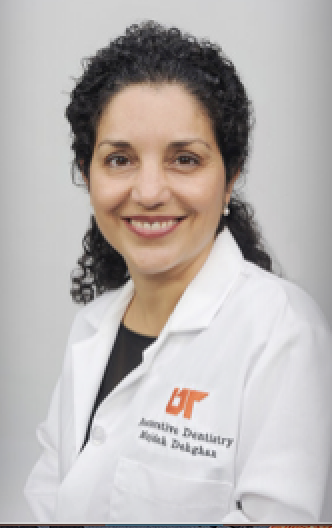Advancing treatment for acid erosion in teeth

Moving an innovation from the initial ideation stage into development for the market can be a long, arduous process. It requires a level of determination and commitment that can be daunting, even for the most persistent inventors.
One University of Tennessee Health Science Center researcher has spent the last eight years developing a technology that prevents and treats acid erosion in teeth – a common clinical condition affecting millions across the country.

“Anything of significance takes time, effort and perseverance,” said Mojdeh Dehghan, professor at the College of Dentistry and associate dean of Faculty and Student Affairs. “At the end of the day, you must believe in your idea and fight for it. But you’re not supposed to do it alone. Reach out for help and collaborate to get where you need to go.”
Nearly a decade ago, with grants from the College of Dentistry Alumni Endowment Fund, Dehghan and Daranee Versluis, professors at UTHSC College of Dentistry, began developing a mouthwash as a treatment for acid erosion caused by eating disorders, acid reflux, morning sickness, chemotherapy and daily consumption of acidic foods and beverages.
Later, the University of Tennessee Research Foundation connected Dehghan and Versluis with fellow faculty member Hassan Almoazen, UTHSC College of Pharmacy Associate Professor and Pharmaceutical Sciences PhD Program Director, who helped them transition the innovation from a mouthwash into its current iteration: Neutramel Lozenges and Lollipops. Over the years, the team has received several UTRF Maturation Grant awards to advance their technology.
“Without UTRF, there would be no Neutramel Lozenges and Lollipops. It’s incredible to have someone validate your interests and the possibility of your ideas,” said Dehghan. “UTRF has encouraged us and provided the means for us to take a concept and develop a product with a patent behind it.”
UTRF’s Staff Attorney James Parrett encouraged Dehghan to apply for 2023 Equalize, a program designed to empower academic women entrepreneurs. Dehghan hopes to leverage the knowledge and connections she gains through the program to find an industry partner to scale production of their products.
“My collaborators and I know the science and the technology,” said Dehghan. “But when it comes to marketing our product or finding an industry partner, we don’t know what we’re doing. I’m very excited that we have this opportunity.”
Over the next few months, Dehghan will work with her assigned mentor, attend educational meetings, and collaborate with others in her 2023 cohort. This summer, she will participate in a virtual pitch competition.
“UTRF couldn’t be happier for Dr. Dehghan, and it’s our privilege to support her; advancing technologies out of the university is no small feat,” said UTRF President Maha Krishnamurthy. “We admire Dehghan’s unyielding commitment to her technology and desire to help patient populations who need access to this innovation.”